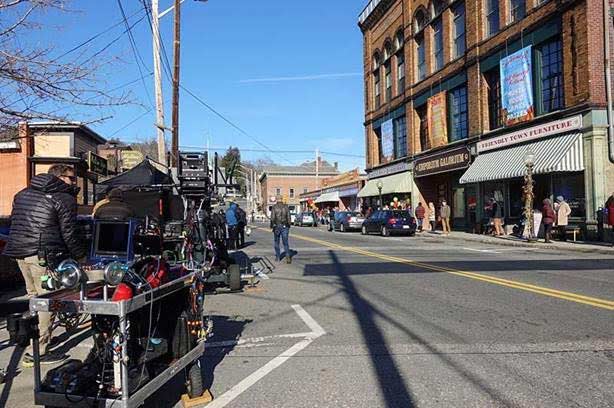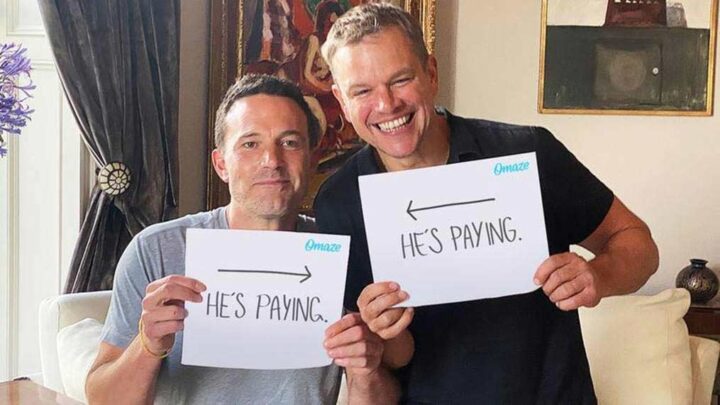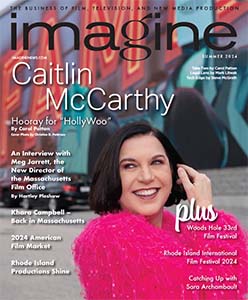It is my deepest heartfelt hope that each and every one of you is whole, well and hardy. But, let’s face it, it is what it is, and even though I am eternally optimistic, I fear it’s going to take longer than we’d like before we are safe to resume our normal routines and workpatterns. Meanwhile it will be challenging.
Someone said, “To thrive in life you need three bones: A wish bone, a back bone and a funny bone.” This is especially true right now.
One thing I know for certain is that there is a pent up demand for our industry to work and when safety to work gets better the amount of production will be legendary.
I firmly believe that everyone who is able is working to make it as safe as possible to work; work has already begun to return to New England and especially Massachusetts. More is expected in November. Both a feature film and TV series have booked New England Studios beginning in November. And it appears the major casting companies are auditioning aplenty.
The Lionsgate – HBO Max pilot, Julia, is once again shooting in Malden. I’m grateful for that as I want this story, it’s a drama, about the whole life of Julia Child and I don’t believe it will be centered on cooking…. Joan Cusack stars; Chris Keyser is the Executive Producer.
Return to Work Agreement
This for our back bone, The Covid-19 Return to Work Agreement with DGA, IATSE, SAG-AFTRA and Teamsters/Basic Crafts have come together and signed this basic agreement for best practices as to how to safely get back to work. This agreement took months to hammer out as every entity did its best to insure the safety of its members. And yes, there will be testing. “Prospective employees shall be tested for COVID-19 prior to the start of employment…” There are three methods of testing acceptable. And there will be periodic testing by zone. Zones are established by how safe your job is – the amount of PPE, etc. If you’re working remotely, no test is required. And there will be temperature tests at least once a day. Believe me, this is just a thumbnail with many variables.
The agreement is long, but thorough. If you would like to read the full agreement you can find it here on our website.
MA Film Tax Credit Sunset Date
And so, deep breath, it appears that slowly the production business is beginning its comeback across the U.S. and Canada. Perhaps a bit more quickly in Massachusetts as reported to me by industry participants.
Here in Massachusetts industry workers and supporters have had their eyes on a very important prize and that is the elimination of the state’s film tax credit sunset date. We all know that studios and major producers need to have confidence that when their production is ready to go, a credible film tax credit will be intact.
Our industry plan was to get legislation that would end our Film Tax Credit sunset date earlier this year. But, due to the pandemic, legislative needs exceeded its normal capacity and our bills were not taken up. Perhaps understandably; perhaps not, as I believe a booming film and television production
industry would provide enormous support for a quicker recovery in the Commonwealth. Our burgeoning industry in 2008 genuinely helped Massachusetts weather that depression and we didn’t have near the difficulties that many other states experienced across the country. We will certainly do that again; that is if we can eliminate our sunset date.
Productions are attracted to Massachusetts because of our superior film tax credits. There is no debate about that. It is an actual fact.
Castle Rock Season 1 Study of Economic Impact

October 21, 2020, I attended a Zoom session that was an industry briefing for our legislators. Its intention was to refresh our legislators in a very spectacular way about the successes our industry has brought to our region. It reported a new study that supports our interest. This is a first-of-a-kind economic impact study that clearly demonstrates the effectiveness and viability of our industry. The
report covered the first modern episodic TV series shot in Massachusetts in twenty-five years and created 1,026 jobs for starters.
Hulu’s Castle Rock Season 1 study quantified a powerful economic impact of episodic TV and streaming production in Massachusetts. Here are some of the highlights from the study:
“Season 1 of Hulu’s Castle Rock, generated $69 million in economic activity across more than 210 towns and cities in the state, according to an economic impact study released today. With the local film industry poised to be a catalyst for the state’s economic recovery, the study reveals that production of the Warner Brothers series generated approximately $4.73 of in-state economic activity for each dollar of state tax credit anticipated to be issued to the production.”
“After years of growth and development for our local film industry, Castle Rock represents the enormous increase in production for streaming platforms and the future of film and TV production in Massachusetts,” said Chris O’Donnell, Business Manager of IATSE Local 481, the union representing technicians and craftspeople on film sets. ”Episodic series employ more local workers for longer periods of time, use more local businesses, and are the engine of growth for the industry in Massachusetts. In the three years since the filming of Castle Rock Season 1, five other episodic series have already filmed in Massachusetts.”
“Castle Rock illustrates the impact that film, TV, and streaming productions are having in the Commonwealth over and over again,” he continued. “This study quantifies how a single production can provide hundreds of workers with good-paying union jobs and support local businesses all across the state. These are exactly the types of jobs and investments the state needs to grow our economy following
the COVID-19 economic crisis.”
Produced by Warner Bros. Television for the streaming platform Hulu, Castle Rock, a psychological thriller series based on the works of Stephen King, was based at New England Studios in Devens, Massachusetts. The first season of Castle Rock was in production between March 2017 and February 2018 and premiered on Hulu on July 25, 2018. Filming took place in Devens and throughout the state, with major on-location filming occurring in and around the town of Orange, Massachusetts. A second season,
produced at New England Studios in 2018 and 2019, premiered on Hulu on October 23, 2019.
“Our $35 million studio, built eight years ago, has been fully booked for the past few years, and there’s constant demand from the streaming companies for additional space,” said Gary Crossen, General Manager of New England Studios in Devens, which has hosted major TV and streaming productions such as Hulu’s Castle Rock, Netflix’s The Society, and Apple TV+’s Defending Jacob. “Massachusetts needs more state of the art infrastructure, such as our studios. And whether additional studios are built by us or some other investors, it would make no sense to do another multimillion dollar building project for a business that may go away in less than two years.”
“All the major production companies I deal with need clarity about the future of the state’s commitment, as they plan feature films and series several years out,” he continued. “The film and television industry can be the economic infusion our economy needs going forward, but only if legislators eliminate the sunset of the production incentive program and provide certainty to our industry.”
During the legislative briefing, workers who were employed by Season 1 of Castle Rock discussed the impact it had on their lives.
“Without Castle Rock I would have had to be on Massachusetts state health insurance, but due to my employment as a recurring stand-in I was able to earn insurance through my union, SAG-AFTRA,” said Andrea Lyman, New England Local President of SAG-AFTRA, who worked on both seasons of Castle Rock. “Episodic series like Castle Rock help provide hundreds of Massachusetts workers with steady wages and benefits every year.”
Attending legislators lauded the Film & Television Production Incentive program for creating jobs and economic impact across the state, and warned that the sunset needs to be removed to ensure its benefits continue in the future.
“Massachusetts has many tax incentives and programs that primarily benefit highly educated, upper income workers, from biotech and finance to IT and insurance. The film production incentive is an important state investment designed to help working families: people without advanced degrees who work with their hands,” said State Senator Paul Feeney (D-Foxborough). “Now more thanever, with so many people out of work or looking for a new career, the film industry is a source of good-paying, family-supporting
union jobs for working families.”
Film Tax Incentive Impact on Our Economy
Since Massachusetts’ Film & Television Production Incentive became law in 2006, over 250 productions have filmed in over 220 cities and towns, together spending more than $2.6 billion in Massachusetts. By
making Massachusetts a leading filmmaking destination, the Production Incentive supports thousands of jobs throughout the state. Film and television productions have a significant impact on a local economy, from buying goods and services from small businesses to donating to local initiatives. Productions have
bought goods and services from thousands of local businesses in over 265 cities and towns – over 75% of all communities in Massachusetts.
But under current law, the program is scheduled to end in December 2022, which would kill this growing local industry and cost thousands of workers their good paying jobs and career opportunities. Pending
infrastructure investors and new multi-year episodic series are making decisions now about investing and where to film in the coming years. The uncertainty created by the approaching end date of the Production
Incentive is affecting business decisions today, and preventing major equipment and infrastructure investments at a time when we need it the most.
114 out of 200 state legislators co-sponsored legislation this session (H.2419 and S.1728) that would eliminate the sunset of the Film & Television Production Incentive program, and protect the jobs and economic benefits it creates.
“Because of the state’s investment over the past decade, Massachusetts has become a leading filmmaking destination. That means thousands of good-paying jobs and millions of dollars in local spending that benefits thousands of local businesses all across the Commonwealth,” said State Senator Michael O. Moore (D-Millbury), lead sponsor of the Senate legislation. “But if the sunset of the production incentive isn’t eliminated, those jobs and spending will disappear again, and many of my constituents will be forced to move to states like New York or California. We need to eliminate the sunset to protect, and
grow, the jobs and economic benefits created by film production here in Massachusetts.”
“In the past few years, we’ve grown our local film industry to the point where we can now regularly attract episodic series that create more jobs and help more local businesses. And with the growth in demand for streaming content after months of increased home viewership, producers are looking at Massachusetts to film many more projects here,” said State Representative Tackey Chan (D-Quincy), lead sponsor of the House legislation. “The local film industry is poised to help drive forward our economic recovery, but the sunset of the production incentive stands in the way. It’s time to remove the
uncertainty that’s preventing investments in Massachusetts film production, and let this creative industry create even more jobs.”
By making Massachusetts a leading filmmaking destination, the Production Incentive supports thousands of jobs throughout the state – from the sales representative at a lighting rental company, to the forklift operator at the local lumberyard, to the costumer on the film set. From 2006 to 2016, over 17,500 new jobs were created with an average salary of over $68,000. 70% of those jobs went to Massachusetts residents. The Netflix series The Society employed over 900, and the film LITTLE WOMEN employed over 500.
Hundreds of businesses have expanded and been created to meet the growing demand of the film and television industry. Because of the Film & Television Incentive program and the productions it has attracted, there are now more than fifty high tech post-production and visual effects companies across Massachusetts employing more than 550 highly skilled workers. These local entrepreneurs are building
small businesses that are part of the state’s growing creative and cultural economy.
And this is for our wish bone, due to the Covid-19 pandemic, the Massachusetts Legislature extended their legislative year to the end of the year. Yes, it was because they had so many new considerations
and community necessities to tend to. Because of that our industry bills were continuously not able to get on the docket. But, we’re still hopeful for this year. We need to do our best to make that happen for all the aforementioned reasons. What we can do is stay in touch with our Senators and Representatives even though they may have already confirmed that they are supporters of our bills. We need to keep our issues top of mind and push to get passage this year. It means so much to give that piece of mind to all the studios and major producers when they are considering locations for their film and TV productions.
Lunch with Matt & Ben

This is for our funny bone because this would be fun. Massachusetts natives Ben Affleck and Matt Damon are looking to take a lucky fan and their friend out for an action packed lunch in Los Angeles at one of their favorite spots as they try to raise money to help the people of eastern Congo.
People can donate money to the Eastern Congo Initiative, founded by Affleck and Whitney Williams in 2010; you will need to go through the Omaze website to gain entries into the lunch-date contest.
One entry can be submitted without contributing to the initiative, but the more money donated, the more entries a person will receive.
We know these guys grew up together; won an Oscar together for GOOD WILL HUNTING. They’re best pals and lunch with them would be an amazing treat.
The winner and a friend will be flown out to Hollywood when it is safe todo so and join Affleck and Damon for a meal.They will also be put up in a four-star hotel. Whoopee! Visit Omaze for more details.



